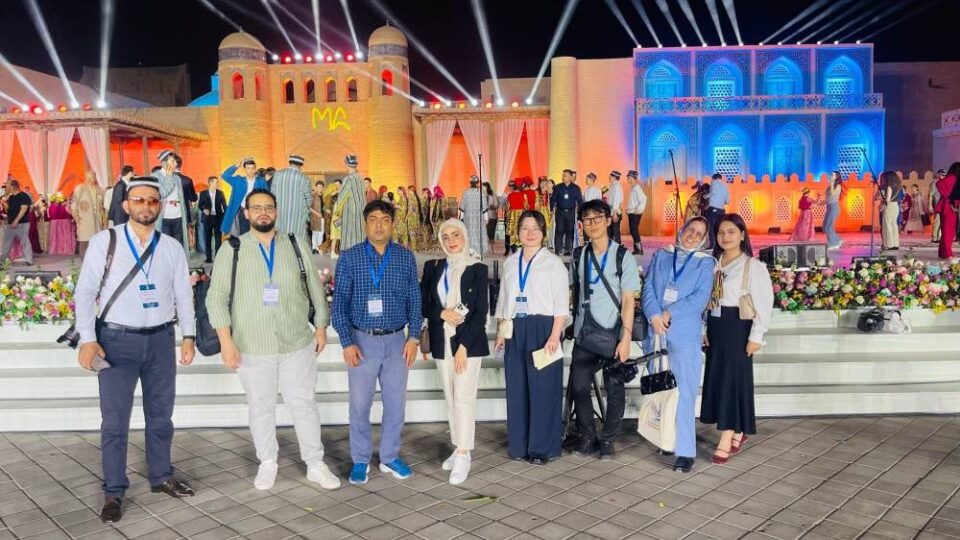Khiva, the majestic Silk Road city in Uzbekistan, witnessed a dazzling celebration of oral tradition, music, and cultural diplomacy as it hosted the 4th International Festival of Bakhshi Art from April 26 to 28, 2025.The historic event, organized under the auspices of UNESCO and ICESCO and with the support of the Uzbek government, brought together nearly 200 participants from over 40 countries. It highlighted the importance of bakhshi art—a unique form of oral epic storytelling and musical performance that has helped preserve the cultural memory, history, and identity of the Uzbek people and other cultures across Central Asia for centuries.Bakhshi, or traditional storytellers, are considered the custodians of oral epics, reciting tales of heroism, wisdom, and folklore through voice and instruments like the dutar. This centuries-old tradition, deeply rooted in the cultural heritage of Uzbekistan, has long been recognized as a cornerstone of the nation’s intangible cultural identity.The 2025 edition of the festival in Khiva followed earlier successful editions in Termez (2019), Nukus (2021), and Gulistan (2023). Each iteration has gained increased international attention, evolving into a global platform for the preservation, promotion, and study of epic storytelling traditions.The festival opened with a grand ceremony that transformed Khiva’s historic old town into a living stage. The sound of traditional instruments resonated through the ancient city walls as master bakhshis from Uzbekistan and around the world delivered epic performances. The setting itself—Khiva’s architectural grandeur and Silk Road charm—added a profound layer of authenticity and meaning to the performances.A number of high-profile cultural dignitaries attended the festival. These included Sultan Raev, Secretary General of the International Organization of Turkic Culture (TURKSOY), and Aktoty Raimkulova, President of the Foundation for Turkic Culture and Heritage. Mehmet Sureyya Er, Secretary General of the Turkic Parliamentary Assembly, Shahin Mustafayev, President of the Turkic Academy, and Adil Kerimli, Azerbaijan’s Minister of Culture, also participated in the festivities, alongside other top-level officials and cultural leaders from across Central Asia, the Middle East, and beyond.Delegations from countries as diverse as Oman, Gabon, Brazil, China, India, Iran, Kazakhstan, Korea, Kuwait, Malaysia, Egypt, Russia, Hungary, Mongolia, Serbia, France, Japan, the United Kingdom, Sweden, Saudi Arabia, Tunisia, Qatar, and the Philippines showcased the truly international nature of the event.Cultural Dialogue through ScholarshipAn academic and cultural highlight of the festival was the Second Forum of Turkic World Culture and the International Scientific-Practical Conference on the theme “The Art of Bakhshi in New Uzbekistan: Modern Research and Prospects,” which took place on April 26 and 27.Scholars and researchers presented original work on the historical development, linguistic elements, musical structures, and sociocultural relevance of the bakhshi tradition. The conference featured lectures and discussions led by renowned experts such as Karl Reichel, Fikrat Turkman, Eunkyung Oh, Hikmat Guliyev, Oguz Mehmet Ocal, Selami Fidakor, Metin Ekiji, and Aynur Ibrahimova.The conference culminated in the adoption of a resolution aimed at intensifying global and regional collaboration in the preservation of epic storytelling. Among its key recommendations were the development of detailed research studies on the origins and evolution of bakhshi traditions, the establishment of digital and audiovisual archives, and the reinforcement of the master-apprentice educational model. Participants also pledged to expand academic exchanges and cultural partnerships, promote young talents through international competitions, and organize regular gatherings of experts, researchers, and performers to further explore this living tradition.A proud achievement of the conference was the presentation of “BAXSHI AYTIMLARI,” a comprehensive printed collection of bakhshi texts and folk epics, which was distributed to all participants. This publication, along with the proceedings of the conference, underscored Uzbekistan’s commitment to scholarship and cultural dissemination.International Bakhshi Art CompetitionOne of the most anticipated components of the festival was the International Bakhshi Art Competition, held on April 27. Bakhshi performers from Uzbekistan and other countries competed in categories such as Epic Performance and Instrumental Performance. The competition showcased dazzling renditions of historical epics, blending intricate storytelling with musical mastery. An international jury consisting of cultural figures and scholars from Hungary, Azerbaijan, Kazakhstan, Russia, Kuwait, and Mongolia adjudicated the contest.Winners were recognized with generous awards, including a Grand Prix of $7,000 USD, as well as first, second, and third prizes of $5,000, $3,500, and $2,500 respectively. The contest not only celebrated talent but also reaffirmed the importance of supporting and nurturing traditional art forms in the face of globalization.The festival concluded on April 28 with a spectacular closing ceremony and an awards presentation that celebrated the artistic and academic accomplishments of the previous days. The event was not only a celebration of bakhshi art but also a platform for building sustainable cultural bridges. Several cooperation agreements were signed between institutions, universities, and cultural centers from participating countries, laying the groundwork for future collaboration in research, education, and performance.All participants received international certificates from the Ministry of Culture of Uzbekistan, along with commemorative gifts that served as symbols of friendship and mutual respect. The festive spirit, scholarly vigor, and international camaraderie of the 4th International Festival of Bakhshi Art reaffirmed Uzbekistan’s role as a vibrant center for cultural exchange and the protection of intangible heritage.As the final performances echoed through the historic courtyards of Khiva, the message was clear: the voice of the bakhshi, rooted in the past but alive in the present, will continue to inspire generations to come.

previous post